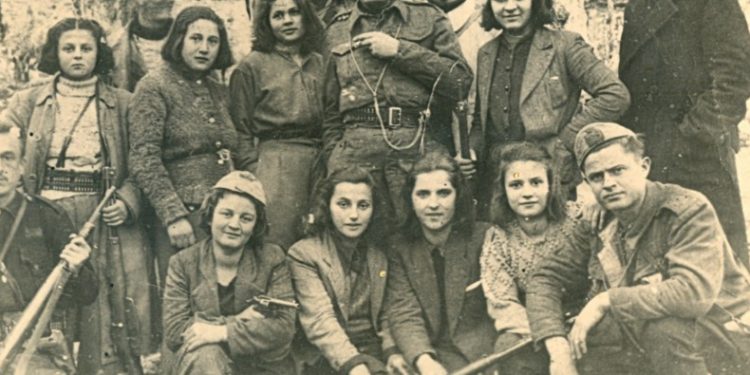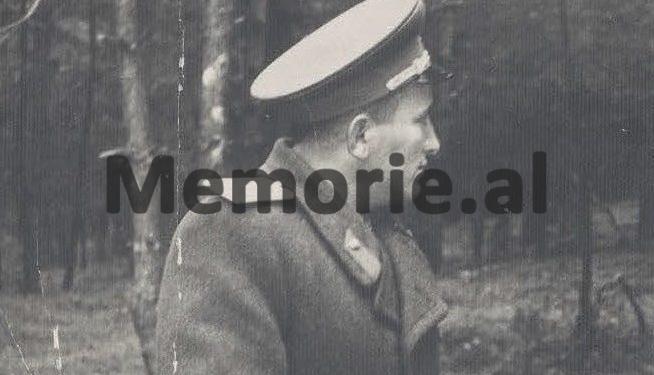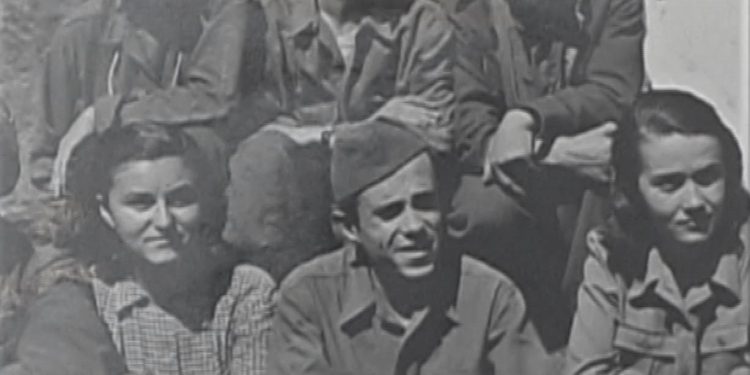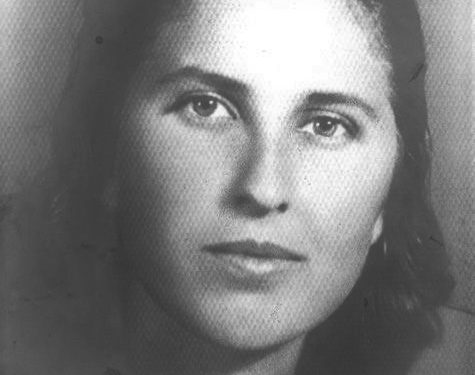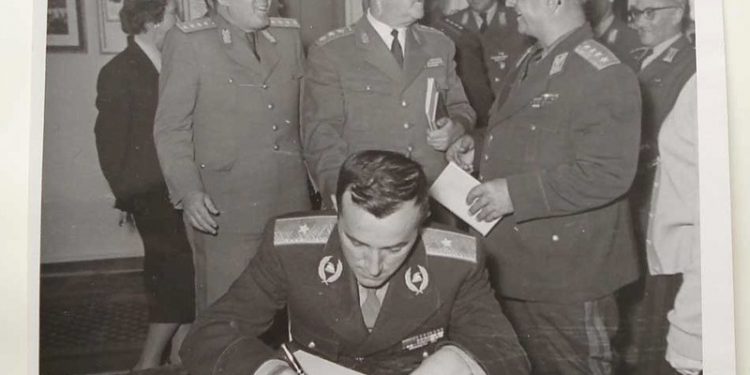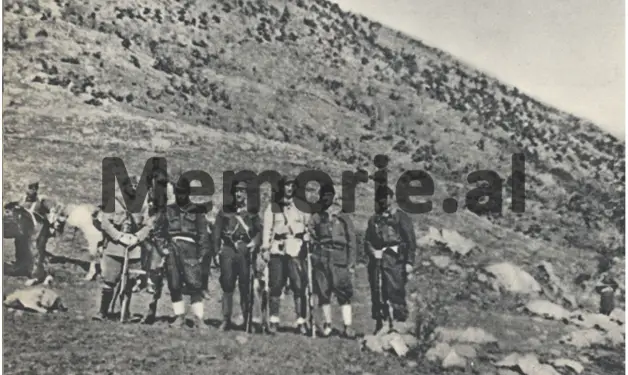By Halim Ramohito
The fifth part
Memorie.al / Halim Ramohito, one of the remaining former generals from the group of soldiers who were arrested and exiled as the “coup group” of 1974, by Enver Hoxha. At the head of this group was Beqir Balluku, and behind him, the most honorable caste of soldiers of the time, among them General Ramohito, who, after participating in the ranks of the National Liberation Army, had served as a representative of Albania and as a military attaché in The Treaty of Warsaw’. A witness to the break with the Russians, Ramohito would later become a witness to the destruction of the Albanian army by the dictator Hoxha, who showed that during his stay in power, he did not want qualified people around, but only servile ones. Ramohito, calm and with the coldness given to him by the distance of time, took out and published his memoirs, without which perhaps the history of that time with the “coup group” would not be complete, and might even be written crookedly or deformed …!
With a rare sincerity, he recounts his feelings during the infamous meeting of the PPSh Central Committee, where the military caste of the time, led by Beqir Balluku, were expelled from the party, then arrested and exiled for years. Even though he had to take off his jacket gradually, to work the land like a farmer in the long exile, even though he had to stop seeing his mother even in death, his biggest hostage, the “self-criticisms” that he had to, for the sake of the party. “Enveri killed us even with our own hands…! – writes Ramohito, in the first part of his memoirs, “In the service of my Fatherland”, published by “Grand-Prind”.
Continues from last issue
The script in the execution of Ramize Gjebre
In the post-liberation years, I was given the opportunity to talk with my close friends, leaders of the Third Partisan Battalion, where Ramizeja stayed for two months, as long as the Nazi-Quisling Winter Operation of 1943-’44 continued. I also talked with my fellow partisans from the village of Vuno, Zaho’s birthplace. From these conversations and from the description they make of Zaho’s relationship with Ramizena, knowing them closely, no one has denied that they had signs of mutual sympathy for each other.
According to the description made by Sofokli Lazëri, in the memoir “The return of the pain” (events which, as far as Sofua knows, he also lived), all these manifestations of sympathy between Zaho and Ramizena in that period of the war, are seemed to him natural and human and without any exaggeration, which maybe later, could turn into a permanent marriage relationship between them. It has been said and written that Nako Spiro had close ties with Ramizena when she was working in Tirana.
This may be a true fact, but equally true and very significant is the other fact that, when Nakua found out about the murder of Ramize, he was the first to strongly denounce this criminal act, he was the first the one who denounced it forcefully, even at the Albanian Anti-Fascist Youth Congress in August 1944, in Helma t Skrapar, and he did so with courage and foresight, not from a personal perspective, but from a principled one.
I have written the details of this attitude above (in the section where I talk about Nako). In that period, but maybe even now, there may be special friends, who still reason with the old mentality, when girls in Labëri were sold and bought just to give birth to children, or they entered into arranged marriages, without their knowledge, etc..
It is senseless that these friends, at that time, but also now, dare to justify this crime, with the alleged fact that Ramizeja, with her sympathy for Zaho, violated our first marital relationship, and she allegedly did this ” at the time when our comrades were freezing in the snow and giving their lives in the mountains of Vetetima, in the region of the Sea Coast, etc. The very life and war of Ramize, in the battalion and during the Winter Operation, have proven that even these judgments were just ordinary slander.
The facts show that even during the Winter Operation, Ramize Gjebrea, together with Zaho Koka, fought daily, and at the same time led the partisans of their battalion, in the high mountains with snow and frost of Vetetima, during long marches and daily matches with the Nazis. and their tools. But even in these difficult conditions, Ramizeja found the time to write down her impressions about this war, she also found a way to send these impressions to the Anti-Fascist Youth newspaper of that period, “Robbery of freedom“, in Tirana.
Here is the content of a letter, written by her hand from the mountains of Vetetima, on the village of Vuno on the coast, a letter accompanied by an article for this newspaper and signed by her as usual, in a somewhat original way, “Rami – Craft”:
“I don’t have the time, nor the condition, to write to you long and in detail. I am writing this letter, – she addresses the colleagues of the editorial staff of this newspaper, – on my feet and, as you can see for yourself and from the many ink stains that have fallen on this letter, the snow and the storm at the moment and in these mountains, they don’t even let you breathe. We have two weeks that our legs have not taken any ground, fighting and breaking every day siege after siege.
The partisans of the Third Battalion, of the Fifth Partisan Assault Brigade, with whom I am, are poorly dressed, with bread and no bread, but, nevertheless, the bravery and courage of the young men of the battalion amazes you, when they even in these terrible conditions, not only do they not bend, but they also do heroics that are unimaginable…”!
I had the last meeting with my unforgettable friend and sister, Ramize Gjebrena, in the village of Ramicë, on March 3, 1944, under the following circumstances: Our Fifth Partisan Battalion, in those days, was stationed in the village of Velçë in Vlorë, with the task of did not allow any surprise enemy incursion from that direction. As I have mentioned in these memories, I was at that time the deputy commissar of this battalion. Together with the battalion commissar, Rrahman Parllaku, we were called to receive instructions at the Brigade headquarters in Ramica.
There, after I finished work, I asked to meet with Ramizena, but to my surprise, I found her lying and covered with a veil (wool blanket), in a narrow corridor of the office of the Council of the Anti-Fascist National Liberation Front in the district, in a very sad and disfigured state and, for that, I was very sorry. She did not tell me anything about the incident, for which they accused her. When I asked him about his condition, he only said: “Halim, the way you look at me, I’m very sick…”!
Later, I learned from others about the incident with Ramizena and the reason why she was in that physical condition. Silently, I too, at that time, agreed with the created situation and with the belief that the leading comrades of the Brigade would analyze and decide on the matter for which she was being accused and I did not ask that the accusations against her be laid again seen at the meeting of leaders of the Anti-Fascist Youth Union of Vlora district, where I was also a member.
Later, on March 5, what happened that should not have happened in any way, the shooting of Ramize…! I wasn’t there at the time of the shooting, but the names and the positions they took in this staged and anti-human “trial”, each participant in it, are in the State Archives, together with some reports made by the main comrades of the Battalion of Third partisan, related to Zaho Koka’s relationship with Ramizena.
In all these judgments, there is only tendency and fatal prejudice and nothing more! In any article written in any newspaper even now, attempts are made to blame this decision only on specific persons, participants in this “meeting”. In my opinion, all the participants of the “meeting” are responsible for that cruel decision that was taken there against Ramize.
My friends from the Brigade, who are lined up at the shooting site, have told me that when Ramizena was escorted in front of the battalion, lined up in a small square in the village of Ramicë, from her appearance, the impression was created that she thought they brought her there to talk and do self-criticism only. And why would he do this, for an intrigue based on a fanatical and anti-human mentality, where his shadows were also visible in this line…?!
Two or three of the partisans present did not even let her speak and, with a signal, shot in her direction, but the bullets did not hit the mark, because even these partisans, it seems, were confused about what was going on. happened. Those who were closest to Ramize in those moments told me that they only heard her say the last words for her: “Why…”?! What are you doing like this…”?! Why do you kill me…?!
At these moments, the thought and reflection of the partisans, one of the main cadres of the third battalion, S.S., intervened, who, with a revolver in his hand and in the most barbaric way, hit him, immediately laying him on the ground. Ramizeja was buried in the village of Ramicë. I repeat, the minutes with the names of the cadres who participated in this macabre “meeting” and their discussions, as well as the reports of some leaders of the Third Battalion on this matter, are in the State Archives.
From these documents, there is no fact that any participant in this “meeting” showed any opinion contrary to that of the cruel decision or that any single participant imposed this decision on others, as it is said in some press. All participants in the consideration and decision on this matter, without any exception, have agreed on that cruel decision and all, in my opinion, have responsibility. Likewise, all of us, the senior cadres of the Anti-Fascist Youth Union of the Vlora region, are also responsible for not even raising our voices to protect our leader, Ramize Gjebreja.
Hysni Kapo, since during the War, has told me that; “our decision to kill Ramize was wrong…”! Sofokli Lazëri, who is also an eyewitness of this drama, has written a book entitled “The return of pain, Zahua and Ramizeja”, with the content of which, in general, I also agreed. Sofua also told me that Hysni Kapua gave me the orders to write for them directly. “Even the main ideas of the book I wrote, – Sofua told me, – are Hysni Kapos.
Since May 1944, I continued to perform the duties of the head of the Youth of the Fifth Brigade and, at the same time, that of the deputy commissar of the fifth battalion. After returning from the congress of the Anti-Fascist Youth Union in Helma, in August 1944, I was called to the city of Peshkopia by the deputy commissar of the Brigade and later of the First Partisan Division, Manush Muftiu.
After communicating my election, in absentia, to this Congress as a member of the General Council of BRASH, he instructed me that, despite the fact that the forces of the Brigade were engaged in fighting, in the mountain range of Korabi, to immediately convene the Committee of To the youth and all the youth organizations of the Brigade… to analyze the “blunder”, as he told me textually, that we did with the murder on March 5, 1944, of Ramize, in the village of Ramicë…!
“For this act we committed,” Manushi told me, “We were severely criticized at the BRASH Congress in Helma i Skrapar, and Hysni and I admitted our guilt there. Now that we are on the threshold of liberating the country, – Manushi instructed me, – we must look at the problems of partisan morale more broadly. We will soon descend on the cities and the people there must look to us, not only his brave partisans and liberators, but also emancipated people.
“No one has stopped and cannot now stop the partisans of our Brigade, – concluded Manushi, – from making friends with their fellow partisans of the war”. Our analyzes of this problem should have as content, the correct understanding of the problems of partisan morality. Although it was done very late and only after pressure from above, especially from Nako Spiro, this work later had an understanding and a fair reaction to the criminal as well as tragic shooting of Ramize Gjebre.
Young partisans of our Brigade, unanimously, condemned the manifestations of sectarianism in this direction as well and especially the crime committed against their leader, Ramize. Thus, in the spirit of the decisions of the August 1944 Congress of BRASH in Helmas, we analyzed the problem of partisan morale even more deeply and responsibly in the committee and in all youth organizations of the Brigade.
After those analyses, relationships, even marriages, between partisan young men and women, even among those of our Fifth Brigade, which stood out from other partisan units more, for a sectarian spirit, especially in this direction, began. And, perhaps since that time, that well-known expression remained: “engagement and marriage, out legal”. As far as I know, immediately after the liberation of the country, with the intervention especially of Nako Spiros and the deputy of Vlora, the former chairman of the Anti-Fascist National Liberation Front Council of the district, Hasan Pulos, Ramizeja was officially rehabilitated.
I remember that one of the main leaders of BRASH, Alqi Kondi, in the press of the time, published a long article about Ramizena, who he rightly described as one of the prominent leaders of the Albanian Anti-Fascist Youth. After the liberation of the country, at the beginning of 1945, Ramize’s mother and her entire family pulled her body from the village of Ramicë and buried her first in the Tufina cemetery in Tirana, while in 1947, her remains were reburied in the cemetery of the Martyrs of the Nation in Tirana, together with her fellow partisans, heroes of the region of Vlora and all of Albania, fallen in the Anti-Fascist National-Liberation War.
In March 1944, her former school and wartime friend, member of the Regional Youth Committee of Vlora, Amali Pjero, was appointed as the head of the Youth of the Partisan Fifth Brigade, in the place of Ramize Gjebre, while since May 1944, in Çajup and until the complete liberation of the country, I (Halim Ramohito) was assigned to this task.
For me, it has been a great honor and obligation to continue working in this position in the Fifth Brigade, a path that was paved by the unforgettable first, my friend and educator, Ramize Gjebreja. I am aware that all the partisans of our Fifth Brigade, who are still alive now, although more than 65 years have passed since her cruel murder, remember and will always remember their first partisan and leader of the Youth of the Brigade.
Ramize Gjebreja, was and will remain in the history of this Brigade, one of the first, among its 363 martyrs. Ramize Gjebrea, not only for her family, for me and for my generation, participants in the Anti-Fascist National Liberation War, but also for todays and future young generations of Albania, has been and will remain in history, a figure enlightened from every point of view, an inspiration of war, morality and work in the service of the motherland.
Although the years pass, even now she will remain a young girl, a rare and smart brave, who gave her life, not only for the liberation of the homeland, but also for the emancipation of the generation of young women of Albania and, for these merits, deserves, as I said above, that her name in the National Museum should be aligned with the names of the most prominent leaders of the Anti-Fascist National-Liberation War. Every May 5, on Martyrs’ Day, I, her student and war friend, have the honor to put a red carnation on her grave…! /Memorie.al
The next issue follows




